| Srl | Item |
| 1 |
ID:
105282
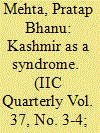

|
|
|
| 2 |
ID:
115879
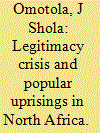

|
|
|
| 3 |
ID:
077887
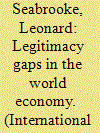

|
|
|
|
|
| Publication |
2007.
|
| Summary/Abstract |
Since the Asian financial crisis of 1997-1998, the International Monetary Fund (the Fund) has been embroiled in an international crisis of legitimacy. Assertions of a crisis are premised on the notions that the Fund's voting system is unfair, that the Fund enforces homogeneous policies onto borrowing member states and that loan programmes tend to fail. Seen this way, poor institutional and policy design has led to a loss of legitimacy. But institutionalised inequalities or policy failure is not in itself sufficient to constitute an international crisis of legitimacy. This article provides a conceptually-driven discussion of the sources of the Fund's international crisis of legitimacy by investigating how its formal 'foreground' institutional relations with its member states have become strained, and how informal 'background' political and economic relationships are expanding in a way that the Fund will find difficult to re-legitimate. The difference between the Fund's claims to legitimacy and how its member states, especially borrowers, act has led to the creation of a 'legitimacy gap' that is difficult to close. However, identifying the sources of the Fund's international crisis of legitimacy allows us to explore what avenues are available to resolve the crisis.
|
|
|
|
|
|
|
|
|
|
|
|
|
|
|
|
| 4 |
ID:
139391
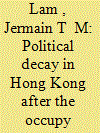

|
|
|
|
|
| Summary/Abstract |
This article examines the political crises of Hong Kong after the mass sit-in of the Occupy Central Movement. Lasted for 79 days, the mass-in of the Movement was organized to force the governments of China and Hong Kong Special Administrative Region to adopt a genuine democratic process for electing the chief executive of Hong Kong in year 2017. The end of the Occupy Central Movement mass sit-in did not solve the disagreements between the government and the supporters from the pan-democratic camp on the issue of democratization. Hong Kong is suffering a certain degree of political decay with declining political strength in consolidating a democratic model, maintaining legitimacy, running an effective government, cementing social cohesion, and preserving high degree of autonomy. Consequently, the political capability of Hong Kong government to govern is weakening and its political strength is deteriorating.
|
|
|
|
|
|
|
|
|
|
|
|
|
|
|
|
| 5 |
ID:
077888
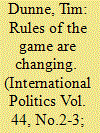

|
|
|
|
|
| Publication |
2007.
|
| Summary/Abstract |
Is there a crisis of legitimacy in relation to fundamental human rights commitments? At one level, the human rights regime has endured legitimacy problems from the outset, in part due to the scope and complexity of the standards but also as a result of the unwillingness of states to regard human rights norms as properly binding. I argue that September 11 and the responses this event triggered in the foreign policies of leading states in international society have taken the challenge to the regime to a new level. What makes it a crisis of legitimacy is the fact that those were crucial to the emergence of the regime, and the rights that are under siege are core 'rights of the person' and not aspirational rights. The closing discussion examines the possibility for a restoration of legitimacy. Consistent with the earlier theoretical discussion, the question of whether and how the legitimacy crisis can be resolved requires a differential response, depending on the site of the crisis, and the location of the audience. The concepts of international and world society provide analytical leverage in identifying both the causes of the crisis and the prospects for its resolution
|
|
|
|
|
|
|
|
|
|
|
|
|
|
|
|
| 6 |
ID:
119236
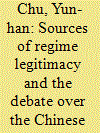

|
|
|